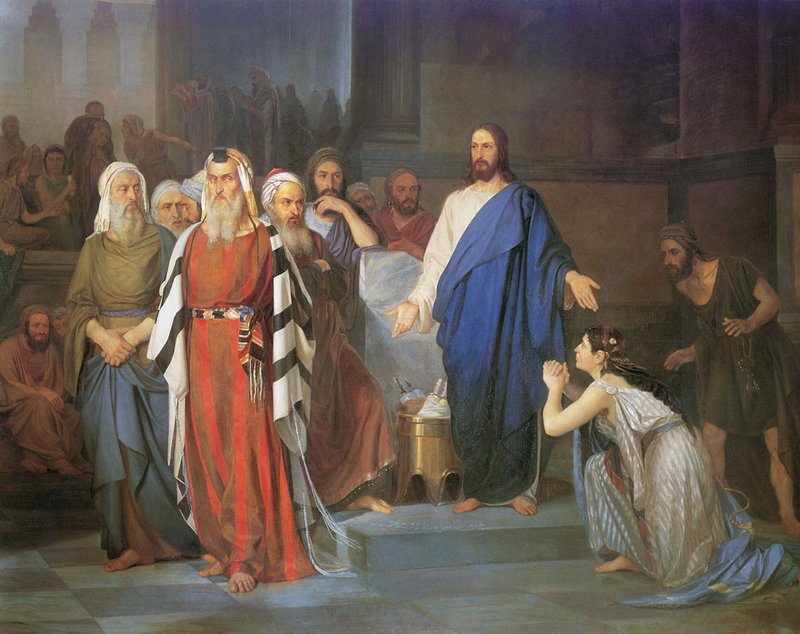When the apostle Paul instructed the Colossian believers to pray for his preaching of the gospel, he said, “that I may make it clear in the way I ought to speak” (Colossians 4:4; NASB). God wants Christians to be clear in the way they communicate the gospel of Christ to non-Christians.
God uses the words “believe” and “faith” more than any other words as conditions for salvation from hell in the New Testament (e.g. Matthew 9:22; Mark 1:15; 5:34; 10:52; Luke 8:12, 48; 17:19; 18:42; John 1:12; 3:15, 16, 18, 36; 4:10-14, 25-28; 5:24, 39-40; 6:35, 37, 39-40, 47; 7:38-39; 10:24-30; 11:25, 26; 12:36, 46-47; 20:31; Acts 10:43; 11:14; 11:17; 13:39; 15:9, 11; 16:31; 26:18. Romans 3:22, 24, 26, 27, 28, 30; 4:3, 5, 9, 11, 13, 16, 22, 24; 5:1; 9:30, 33; 10:4, 10; I Corinthians 1:21;2 Corinthians 5:1-5, 8; Galatians 3:2, 5, 6, 7, 8, 9, 11, 14, 22, 24, 26; Ephesians 1:13; 2:8-9; Philippians 3:9; I Timothy 1:16; 2 Timothy 1:12; 3:15; 1 John 5:1, 13; et. al). But instead of using the words that God uses the most in the New Testament to tell non-Christians how to respond to the gospel, many Christians have inserted other words or clichés to communicate the most important message given to humanity.
When inviting a non-Christian to respond to the gospel (I Corinthians 15:1-6), avoid invitations that do more to confuse a lost person than clarify what he or she must do to get to heaven. We will evaluate some common gospel invitations according to what the Bible teaches.
1. Accept Christ.
a. The one verse that alludes to this possible invitation is John 1:12: “But as many as received Him, to them He gave the right to become children of God, to those who believe in His name.” This verse makes it clear that the way to receive or accept Christ is to “believe in His name.” Receiving Christ is the result of believing in Him.
b. The danger in asking people to accept Christ is that they may accept Christ as a Person (just as we may accept one another as a person) and still depend on their good works to get them to heaven without ever trusting in Jesus alone as their only hope of heaven.
c. This invitation can be very confusing especially for Roman Catholics who are more inclined to think of accepting or receiving Christ by partaking of the Eucharist. If you invite a Roman Catholic to receive Christ, he or she may think you are referring to receiving His body (bread) and blood (cup) in the Eucharist instead of believing in Jesus. In their minds, receiving or accepting Christ is done repeatedly.
2. Turn from or be sorry for your sins.
a. No human being, Christian or non-Christian, can stop sinning (I John 1:8, 10).
b. The word “repent” (μετανοέω) refers to a change of mind about whatever is keeping an unbeliever from believing in Jesus, and then believing in Him for everlasting life (Mark 1:15). The non-Christian may need to change his mind about the Person of Christ (Mark 1:15; Acts 2:38), God (Acts 20:21), idols (Revelation 9:20), sin (Revelation 9:21), or his works (Hebrews 6:1; Revelation 16:11) before he can believe in Christ alone for the gift of salvation.
c. Repentance cannot refer to sorrow for sin or turning from sin because in the Old Testament God repents (e.g. Genesis 6:6-7; Exodus 32:14; Jeremiah 26:19; Jonah 3:9-10; et. al.). If repentance meant turning from sin or sorrow for sin, then God would be a sinner.
d. The gospel of John which was written to tell non-Christians how to get to heaven (John 20:31), never uses the words “repent” or “repentance” as a condition for everlasting life because when one changes from unbelief to belief, he or she has repented. Another possible reason for the absence of these words is they are easily misunderstood to mean something like “turning from sins” or “penance” which involve works. The word “believe,” however, communicates such simplicity that it is less likely to be misconstrued to include a works-oriented response.
e. The issue is not how you feel about sin; it is how God feels about sin. God is completely holy and perfect (Isaiah 6:3; Revelation 4:8; 15:4). The Lord hates sin and demands that it be punished (Genesis 6:5-7; Deuteronomy 25:16; Proverbs 6:16-19; Romans 6:23; Hebrews 1:9). Are you willing to agree with God that you are a sinner in His sight, who deserves to be separated from Him forever in a terrible place of suffering called the Lake of Fire (Romans 3:23; 6:23; Revelation 20:15)?
f. This invitation can confuse people into trusting in their own efforts (turning from sin) or feelings (sorrow for sin) instead of the finished work of Christ on the cross (John 19:30).
3. Confess your sins.
a. Jesus never invited an unbeliever to do this (cf. John 3:15-16; 4:10-14; 6:35-40; 11:25-27).
b. This is what we do after we believe in Christ to restore fellowship or closeness with God after we sin (I John 1:3, 9).
c. The reference to people “confessing their sins” when they were baptized by John the Baptist in the Jordan River (Matthew 3:6) is referring to the self-righteous people of Israel recognizing their sin so they would see their need to believe in Christ. Acts 19:4 says, “John indeed baptized with a baptism of repentance, saying to the people that they should believe on Him who would come after him, that is, on Christ Jesus” (cf. John 1:6-7; 3:23, 36).
4. Pray the sinner’s prayer.
a. Nowhere in the Bible is anyone told to pray a prayer to be saved from eternal condemnation. Jesus never invited an unbeliever to do this nor did the apostles. For example, when the Philippian jailer asked Paul and Silas what he must do to be saved from sin’s penalty, they did not say, “Pray this prayer” or “Pray after me.” They simply said, “Believe on the Lord Jesus Christ and you will be saved” (Acts 16:31).
b. The danger of using this invitation is that people may end up trusting in a prayer instead of trusting in the Person of Christ alone.
c. Often times, people get saved before they ever pray the sinner’s prayer because they have already trusted in Christ’s promise of eternal life.
d. Before leading someone in a prayer, explain to them that praying this prayer does not get them to heaven; only trusting in Christ alone will get them to heaven. This prayer is a way of telling God they are now trusting in His Son.
5. Give your life or your heart to Jesus.
a. This is not what the Bible teaches.
b. The issue in salvation is not what we give to God, but what God gives to us. “And this is the testimony: that God has given us eternal life, and this life is in His Son” (I John 5:11).
c. If we give God our life or heart to get to heaven, we will be very disappointed because our life stops at the grave. We need life that lasts beyond the grave. We need God’s everlasting life which we receive by believing in Jesus alone (John 11:25-26).
d. This invitation is disturbing to children who think in more literal terms.
6. Ask Jesus into your heart.
a. Nowhere does Jesus or the apostles tell non-Christians to ask Christ into their hearts to possess eternal life.
b. When a person believes in Christ alone for eternal life, Christ comes to live inside of him as a result (John 1:12; Romans 8:9; Galatians 2:20; Ephesians 1:13-14; Colossians 1:27), so there is no need to ask Christ into his or her heart
c. Some will use Revelation 3:20 to invite unbelievers to “open the door of their heart.” But in the context of this passage we see that the Lord is speaking to believers who are in need of fellowship with Christ (Revelation 3:14-22).
– The word “heart” is not mentioned in Revelation 3:14-22.
– The word “church” in Revelation is always used of believers (1:4, 11, 20; 2:1, 7-8, 11-12, 17-18, 23, 29; 3:1, 6-7, 13-14, 22; 22:16).
– Jesus is standing outside of the “church”at Laodicea which had grown lukewarm or half-hearted in their service to Christ due to self-sufficiency and deceit (Revelation 3:14-18). Christ spoke of “chastening” (paideuō) them (Revelation 3:19a). The word “chasten” literally means “child-training” and is therefore an activity of God toward His children (cf. Hebrews 12:5-11).
– Jesus also called them to repentance (3:19b). Then He says in verse 20, “Behold, I stand at the door and knock. If anyone hears My voice and opens the door, I will come in [eiserchomai] to [pros] him and dine with him, and he with Me.” The Greek verb (eiserchomai) accompanied by the preposition translated “to” (pros) means “to come or go to someone.”The verse is speaking of entrance into a building toward a person, not entrance into a person. Jesus is saying that He will come in the church toward the person who repents (hears His voice and opens the door of the church) and eat dinner with him i.e. have intimate fellowship with him.
d. Why would Christians turn to the book of Revelation which was written to Christians to help them prepare for future events, when God has given us so many evangelistic verses in the gospel of John which was written to tell non-Christians how to get to heaven (John 20:31)?
e. This invitation can be very confusing for children who tend to think in more literal terms and are easily confused or disturbed by the prospect of asking a literal Jesus to take up residence in their blood-pumping organ.
f. This invitation also gives people a false sense of security. They have sincerely asked Jesus into their heart, but they do not have assurance from the Holy Spirit that they have eternal life because they have missed the only requirement for it which is believe in Christ (I John 5:9-13).
7. Confess Jesus is Lord.
a. One passage that alludes to this possible invitation is Romans 10:9-10, “9 That if you confess with your mouth the Lord Jesus and believe in your heart that God has raised Him from the dead, you will besaved. 10 For with the heart one believes unto righteousness, and with the mouth confession is made unto salvation.” But these verses are talking about being delivered from God’s present-day wrath (displeasure) which is expressed in sinners being given over to the downward spiral of their own sinfulness (1:16-32; 5:9-10). To be delivered from God’s present-day wrath requires both believing in Christ resulting in justification (10:9b, 10a; cf. 1:20-5:9a) followed by confessing Jesus as Lord or “calling on the name of the Lord” (10:13) resulting in victorious Christian living (10:9a, 10b; cf. 5:9b-8:39). This sequence is confirmed by Romans 10:14-15a when the verbs in these verses are reversed – “sent …preach…hear…believe…call on Him.” We see that calling on the name of the Lord is done after believing in Christ and is therefore something Christians do after their conversion to obtain divine assistance in living the victorious Christian life (Romans 5:9-8:39; cf. Acts 9:21; I Cor. 1:2).
b. Confession involves effort and possible persecution (cf. Matthew 10:32).
c. When false prophets (Matthew 7:15) stand before Christ on Judgment Day (Matthew 7:21-23), they will confess the Lordship of Jesus and appeal to the good works they have done in Jesus’ name for His glory (“Lord, Lord, have we not prophesied in Your name, cast out demons in Your name, and done many wonders in Your name?”) as the basis of their entrance into the kingdom of heaven (Matthew 7:22). But Jesus will say to them, “I never knew you; depart from Me, you who practice lawlessness” (Matthew 7:23). Why does He say this? Because they had failed to do “the will of the Father in heaven” as it relates to entering the kingdom of heaven (Matthew 7:21b). Jesus said, “And this is the will of Him who sent Me, that everyone who sees the Son and believes in Him may have everlasting life; and I will raise him up at the last day” (John 6:40;cf. 3:5, 15-16). Until a person is rightly related to Jesus by believing in Him for everlasting life, all their good works and words, including confessing Jesus is Lord, are “lawlessness” before a holy God (Matthew 7:23; cf. Isaiah 64:6).
d. The Scriptures give examples of secret believers who refuse to confess Christ openly with their words and lifestyle for fear of persecution (John 7:13; 9:22; 12:42; 19:38). They still have eternal life, but they will lose rewards for not identifying with Christ openly because of their fear of persecution (cf. Matthew 10:32-42).
8. Follow or obey Jesus.
a. Some use John 10:27-28 to defend this invitation for salvation: “27 My sheep hear My voice, and I know them, and they follow Me. 28 And I give them eternal life, and they shall never perish; neither shall anyone snatch them out of My hand.” But in this passage the word “follow” is a figure of speech referring to belief. In the context, Jesus addresses the unbelief of His Jewish audience, who questioned if He was the Messiah (10: 24). Jesus replied to them, “I told you, and you do not believe. The works that I do in My Father’s name, they bear witness of Me. But you do not believe because you are not of My sheep, as I said to you” (10:25- 26). People who are not of His sheep do not believe (10:26). What then do His sheep do? They believe He is the Christ – the One who gives eternal life to those who believe in Him. They hear His voice and respond in faith like sheep follow a shepherd. They trust Him.
b. Throughout the Gospel of John, figures of speech are used to illustrate saving faith: receiving (1:12), looking (3:14-15), asking (4:10), drinking (4:14), hearing (5:24; 10:16, 27), coming (6:35, 37), eating bread (6:54), entering (10:9) and following (10:27).
c. Following Christ through obedience is necessary to be a disciple of Christ (Mark 1:17-18; Luke 5:10-11; 9:23), not a possessor of Christ. For example, when you examine all four gospels, it becomes clear that the disciples whom Jesus called to follow Him in Mark 1:14-18 had already believed in Christ for about a year (John 1:35-4:35).
9. Commit your life to Christ.
a. Jesus never invited non-Christians to commit their life to Him to obtain the free gift of everlasting life. Many people have pledged to serve God in the hope that their commitment would persuade God to take them to heaven.
b. Promising to commit your life to Christ can actually become a stumbling block, for to be saved from the Lake of Fire one must believe in Christ alone, not Christ plus your commitment (Acts 16:31). Making promises is a form of works-salvation and is foreign to God’s way of salvation (Titus 3:5).
c. This cliché may be an appropriate challenge for Christians to follow Christ and to serve and suffer for Him as His disciple (Matthew 16:24- 27; Luke 9:23).
10. Submit to Jesus as your Lord and Master.
a. Submitting to the Lordship of Christ does not take anyone to heaven because it misses the object of saving faith – believing in Jesus alone for eternal life.
b. The term “Lord” in the name “Lord Jesus Christ” (Acts 16:31) refers to Christ’s deity and unique role in our salvation, not His control over every area of an individual’s life. Only Christ has the ability and authority to punish sin or pardon sinners.
c. Submitting to Christ’s Lordship is a challenge that Jesus gives to people after they are saved, who then have the supernatural resources to enable them to surrender to Christ’s control as a part of the life-long process of discipleship (cf. Luke 14:25-35). Failure to submit to Jesus’ Lordship results in the loss of rewards (cf. Colossians 3:23-24), not salvation.
Conclusion: We are not suggesting that no one has been born again when these clichés are included in a gospel presentation. Evangelist Larry Moyer has said, “God can still use a crooked arrow to hit a target.” God can still use our unclear gospel presentations to help people come to Christ by believing in Him. But why use an unclear phrase or cliché which will do more to confuse a lost person than clarify what he must do to obtain eternal life? Would it not be better to use the clearest presentation possible so that the unsaved person has the best opportunity to respond to the gospel the way God wants him to respond? Let’s keep the gospel clear by using the words God uses the most – “believe” and “faith” – when inviting non-Christians to respond to the gospel!










